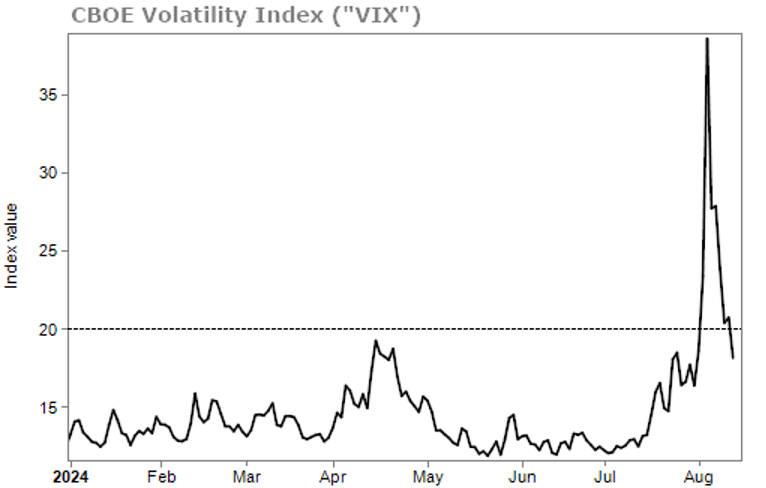"Volatility" was one of the major buzzwords last week...
When markets were plummeting, analysts weren't just following falling stock prices. They were also looking at skyrocketing volatility.
When we talk about volatility, we're specifically referring to the CBOE Volatility Index ("VIX").
The VIX is often known as the "fear index" because it doesn't measure the actual volatility of the stock market. Instead, it measures the volatility that investors expect in the future by looking at the prices of options – which investors can use as protection.
A low VIX – below 20 – means people aren't expecting much action in the markets. They're not fearful, and they're not paying for protection.
A rising VIX signals that people are expecting more volatility in the markets and may be getting fearful.
You can see in the chart below that – so far this year – the VIX has been mostly quiet.
Last Monday, as investors feared a larger market crash, the VIX soared to nearly 40. That's the time we told readers to not panic. We saw an almost immediate rebound in stocks and the VIX just as quickly returned to a more normal level.
But we've warned that we could be in for a rough time as we creep closer to the presidential election in November. I'm usually an optimist when it comes to the markets, but I expect turbulence over the next few months.
My friend Marc Chaikin – founder of Chaikin Analytics – also sees more volatility ahead. According to Marc, more volatility is coming just around the corner due to the "September Effect" and the election cycle.
While Marc is still bullish overall, he says the markets are in for a beating. Fortunately, his experience can help you navigate difficult conditions.
Marc started on Wall Street as an analyst more than 50 years ago. During his time, Marc created proprietary stock indicators – like the industry-standard "Chaikin Money Flow" – that are used by the biggest Wall Street firms and traders all over the world.
A decade ago, Marc decided to help teach everyday investors how to do as well as the "pros" on Wall Street.
Now, let's dig into the Q&A... As always, keep sending your comments, questions, and topic suggestions to [email protected]. My team and I really do read every e-mail.
Q: Doc, I was prescribed testosterone and vitamin D for osteopenia a decade ago. At a recent checkup, the nurse mentioned vitamin D with K2 but was uncommitted to a change. I came away with the understanding that K2 helps with the absorption of vitamin D. What, if any, advantages are there to vitamin D with K2 versus plain vitamin D? Thanks. – J.W.
A: Thanks for writing in, J.W. You're on the right track – vitamin K2 does help out in the bone-strengthening process but in a slightly different way...
You probably know why your doctor advised you to take vitamin D. Just to loop in other readers, this "sunshine vitamin" enhances the absorption of calcium in your intestines so the mineral can get into your bloodstream. That way, calcium can reach your bones to treat your lower-than-normal bone-mineral density, or osteopenia, that elevates your osteoporosis risk.
As for vitamins K2 and K1, they're both forms of vitamin K. This vitamin can activate two proteins, matrix Gla protein and osteocalcin, turning on their ability to grab ahold of calcium. The former helps keep calcium from building up in your blood vessels and hardening them, and the latter helps build more bone with the calcium.
In a nutshell, vitamin K helps "direct" more calcium to your bones. Vitamin K can also activate proteins that help with clotting to prevent excessive bleeding.
So taking a vitamin K supplement sounds like a no-brainer, right? Well, the thing is, most health adults are already likely getting the vitamin K2 needed each day through food. Not to mention, some bacteria in your gut churn out vitamin K2 for you. Why waste your money on supplements if you don't need them?
And if you've been a longtime reader, you know how much of a superfan I am of the adage: "Let food be thy medicine."
So I recommend focusing on vitamin K-rich foods first... Indulge in leafy greens like kale, collard greens, spinach, broccoli, and Brussels sprouts. I love cooking with and/or dressing veggies with extra-virgin olive oil. The polyphenol-rich oil helps my body properly absorb the fat-soluble vitamins D and K.
Along with greens, fermented foods, cheese, eggs, and yogurt work, too. Sauerkraut and Greek yogurt are practically my daily staples.
Not only will you get the extra vitamin K for your bones, teeth, and cardiovascular system, but you'll also get all of the macro- and micronutrients, as well as health-boosting antioxidants.
If your bone-mineral-density scores need an extra oomph, however, check with your doctor before heading toward the supplement aisle. If you have a disorder where you can't absorb nutrients properly or are taking antibiotics, weight-loss drugs, or certain cholesterol drugs, you may be at risk of vitamin K deficiency. Also know that vitamin K can have a dangerous interaction with blood-thinner medications, too.
What We're Reading...
- Did you miss it? Stop wasting your money on overvalued tech stocks.
- Something different: Medicare just negotiated drug prices for the first time.
Here's to our health, wealth, and a great retirement,
Dr. David Eifrig and the Health & Wealth Bulletin Research Team
August 16, 2024

